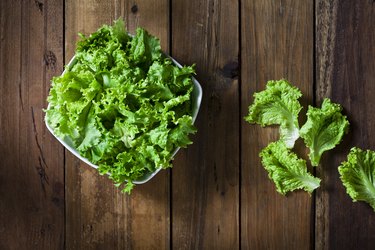
A low-calorie source of fiber and other nutrients, lettuce is an integral part of salads and many other dishes. However, seeing undigested lettuce in your stool can make you a little wary of this leafy green. Here's what you need to know about undigested vegetables in your stool.
Tip
Apart from avoiding lettuce or eating smaller amounts of it, you can try chewing each bite more thoroughly to help your body digest it. You should also see a doctor if you have other symptoms like diarrhea or weight loss.
Video of the Day
Video of the Day
Undigested Vegetables in Stool
The presence of undigested vegetables in stool is not uncommon. The University of California, San Diego (UCSD) states that while 75 percent of your stool is water, the other 25 percent consists of undigested food, bacteria and digestive fluids. In fact, UCSD notes that it's not unusual for your stool to be green after you eat leafy greens either.
You're probably wondering why part of the food you're eating is not getting digested. A June 2012 study published in the Journal of Food Science and Technology explains that your digestive enzymes cannot digest or absorb dietary fiber, so it passes through your digestive system relatively intact.
UCSD notes that because of the inability to break down fiber, some people can't digest leafy greens, which tend to be rich sources of fiber. The result is gastrointestinal problems that can be painful and even embarrassing upon occasion. According to UCSD, whether you can or can't digest leafy greens depends on the type of green and your microbiome, or gut bacteria.
So is it normal for you to see undigested lettuce in your stool? According to the Mayo Clinic, seeing the occasional fragment of undigested food is not a problem, unless it's accompanied by persistent diarrhea, other disruptions to your bathroom habits or weight loss, in which case you should see your doctor.
Read more: Effects of Coffee on Digestion
Remedying Undigested Lettuce in Stool
If you are only facing a problem with lettuce, you can try avoiding it and opting for other greens instead. However, if you find that you can't digest leafy greens in general, then you may have to look for other solutions; for instance, UCSD suggests taking over-the-counter medicines to relieve any gas that you might face when you eat these veggies.
According to the Mayo Clinic, you may also face this issue if you have suddenly increased your fiber intake, in which case it could help to cut back and increase it gradually over a few weeks. This will give the bacteria in your gut some time to adjust to the increased fiber so that it can digest it better.
If you do eat lettuce, you can try eating smaller amounts than you usually would and chewing each bite well, so that it's easier for you to digest and any fragments in your stool are smaller.
If the problem persists and is uncomfortable, you should visit your doctor. Columbia University explains that certain conditions like milk or soy intolerance could cause malabsorption, where your body is unable to absorb nutrition from food, in which case you may have to seek treatment.
Columbia University notes that some surgeries, medications and other health conditions like parasitic infections, certain types of cancer, HIV/AIDS, celiac disease and Crohn's disease could also cause malabsorption.
Gastroparesis is another digestive disorder that could affect your body's ability to digest lettuce and requires medical attention. A small study published in the journal Digestive Diseases and Sciences in April 2015 found that lettuce is one of the foods that could aggravate the condition.
- USDA FoodData Central: “Lettuce, Raw”
- University of California, San Diego: “What Color Is Your Poop and Other Pressing Fecal Matters”
- Journal of Food Science and Technology: “Dietary Fibre in Foods: A Review”
- University of California, San Diego: “Come Kale or High Fiber”
- Mayo Clinic: “Undigested Food in Stool: What Does It Mean?”
- Mayo Clinic: “Dietary Fiber: Essential for a Healthy Diet”
- Columbia University: “Last Night's Asparagus in My Stool — Cause for Concern?”
- Digestive Diseases and Sciences: “Foods Provoking and Alleviating Symptoms in Gastroparesis: Patient Experiences”
Is this an emergency? If you are experiencing serious medical symptoms, please see the National Library of Medicine’s list of signs you need emergency medical attention or call 911.